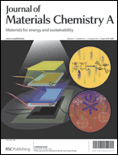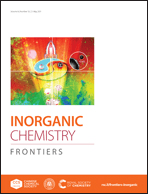
Science China-Chemistry
metrics 2024
Fostering Excellence in Chemical Research and Education
Introduction
Science China-Chemistry, published by SCIENCE PRESS, stands as a leading journal in the field of chemistry, specifically recognized for its contributions in miscellaneous chemistry domains. With an impressive Q1 categorization in the 2023 quartiles and ranking at #35/408 in general chemistry by Scopus, this journal places itself within the top 91st percentile, showcasing its significant impact in the discipline. The journal, based in Beijing, China, provides a platform for innovative research, reviews, and insights that cater to an international audience of researchers, professionals, and students dedicated to advancing chemical science. As an open-access journal, it ensures widespread dissemination of knowledge, making cutting-edge research accessible to all. With converged years from 2010 to 2024, the journal continues to be a vital resource for those engaged with the latest developments in chemistry.
Metrics 2024
 2.32
2.32 10.40
10.40 7.90
7.90 84
84Metrics History
Rank 2024
Scopus
IF (Web Of Science)
JCI (Web Of Science)
Quartile History
Similar Journals

Materials Chemistry Frontiers
Bridging Science and Innovation in Materials ChemistryMaterials Chemistry Frontiers, published by the esteemed Royal Society of Chemistry, stands as a leading journal in the realm of materials science and chemistry, with an impressive Q1 ranking in both Materials Chemistry and Materials Science categories as of 2023. This open-access journal, operating from the United Kingdom, offers a platform for researchers, professionals, and students to disseminate high-quality, impactful research. With its E-ISSN 2052-1537, the journal is dedicated to publishing cutting-edge articles, reviews, and research communications that explore innovative materials and their applications, fostering a comprehensive understanding of the complex interplay between materials and their chemical properties. With consistent rankings in the Scopus metrics, being positioned at the 25th percentile among 317 in the Materials Chemistry category, it highlights its pivotal role in advancing the field. The journal thrives on contributions that broaden the scope of knowledge from 2017 to 2024 and beyond, solidifying its status as an essential resource for contemporary research in materials science.

ACS Materials Au
Empowering a Global Community of Materials InnovatorsACS Materials Au, published by the American Chemical Society, is a premier open-access journal that has been at the forefront of materials science since its inception in 2021. With an ISSN of 2694-2461, this journal encompasses an expansive range of topics including biomaterials, electronic, optical and magnetic materials, materials chemistry, and polymers and plastics, consistently achieving Q1 rankings in these categories for 2023. The journal is based in the United States and operates from the AMS's headquarters in Washington, DC, offering significant visibility and a robust platform for researchers. The journal's commitment to open access ensures wide dissemination of groundbreaking research, enabling a diverse audience—including researchers, professionals, and students—to engage with the latest advancements in materials science. With an encouraging impact factor and a focus on novel materials and innovative applications, ACS Materials Au stands as a vital resource for anyone devoted to understanding and advancing the frontiers of materials engineering and science.

ACS Macro Letters
Elevating Chemical Research with Timely DiscoveriesACS Macro Letters, published by the American Chemical Society, is a leading journal in the fields of Inorganic Chemistry, Materials Chemistry, Organic Chemistry, and Polymers and Plastics. Established in 2012, this journal has swiftly ascended to the forefront of chemical research with an impressive reputation, as evidenced by its 2023 Scopus rankings placing it in the first quartile across multiple categories. The journal's objective is to disseminate timely and concise articles that advance the study of macromolecules and their applications, making it an essential resource for researchers, professionals, and students alike. With a focus on fostering innovation and facilitating collaboration within the chemical community, ACS Macro Letters presents a robust platform for scientists to share their groundbreaking findings. Being based in the United States, it serves as a central hub for global discourse in the chemical sciences, although it does not currently offer Open Access options. The journal's commitment to high-quality content is further underscored by its prestigious impact factor and acceptance into elite academic quartiles, signifying its influence and importance in shaping future research.

Materials Futures
Driving discoveries that redefine materials innovation.Materials Futures, an esteemed journal published by IOP Publishing Ltd, stands out as a pivotal resource in the field of Materials Science, with a particular emphasis on Biomaterials. Launched in 2022 and operating under an Open Access model, the journal aims to foster accessibility and rapid dissemination of pioneering research, thus catering to the diverse needs of researchers, professionals, and students globally. With a commendable Scopus Rank of #46 out of 137 in its category, placing it in the 66th percentile, and recognized as a Q1 journal as of 2023, Materials Futures provides a vital platform for cutting-edge studies and innovations that address contemporary challenges in materials science. As the journal evolves through its convergence period from 2022 to 2024, it continues to attract high-quality submissions aimed at advancing knowledge and applications within the biomaterials sector, reflecting its commitment to contributing vital insights and fostering collaboration across disciplines. Explore Materials Futures for your research endeavors and join a community dedicated to shaping the future of materials.

Inorganics is a vibrant, peer-reviewed Open Access journal dedicated to advancing the field of inorganic chemistry, published by MDPI since 2013. Based in Switzerland, this journal aims to provide a dynamic platform for researchers, professionals, and students to share groundbreaking findings, fostering collaboration and innovation within the global scientific community. With an impressive Q2 ranking in the category of Inorganic Chemistry as of 2023, Inorganics stands out as a significant conduit for high-quality research that spans a wide range of topics from coordination compounds to metal-organic frameworks. Its commitment to accessibility ensures that cutting-edge research can be accessed, utilized, and built upon by a diverse audience, thereby amplifying its impact. Join the conversation in Inorganics and contribute to the ever-evolving landscape of inorganic chemical research.

Journal of Materials Chemistry A
Empowering Research for Environmental ProgressJournal of Materials Chemistry A, published by the Royal Society of Chemistry, stands as a leading peer-reviewed journal in the fields of Chemistry, Materials Science, and Renewable Energy. With an impressive ranking within the top quartile (Q1) across these disciplines in 2023, this journal not only showcases groundbreaking research but also addresses pivotal challenges in sustainable materials and energy. Spanning from 2013 to 2024, it serves as a vital platform for scientists and engineers to present innovative solutions and advances in materials that directly contribute to environmental sustainability. Accessible to a broad audience, the journal's contributions are essential for anyone engaged in the development of new materials and technologies that promise to shape a greener future. With a commitment to high-quality open access publishing, the Journal of Materials Chemistry A is instrumental in disseminating impactful research to enhance scholarly communication and foster collaboration in an increasingly interconnected research landscape.

Inorganic Chemistry Frontiers
Advancing the Boundaries of Inorganic ChemistryInorganic Chemistry Frontiers, published by the esteemed Royal Society of Chemistry, stands at the forefront of advancements in the field of inorganic chemistry, boasting a prestigious Q1 ranking in its category as of 2023 and an impressive Scopus Rank of #3 out of 79, placing it in the 96th percentile. Since its inception in 2014, this journal has provided a robust platform for high-quality research that spans the diverse and rapidly evolving areas of inorganic chemistry. As an open-access journal, it ensures that the findings presented are readily accessible to researchers, educators, and practitioners globally, fostering an inclusive environment for the dissemination of knowledge. With its rigorous peer-review process, Inorganic Chemistry Frontiers aims to facilitate interdisciplinary dialogue and innovation, making it an essential resource for anyone dedicated to exploring the myriad applications and theoretical advancements within inorganic chemistry.

Organics
Empowering Researchers with Accessible InsightsOrganics is a peer-reviewed journal dedicated to the advancement of research in the field of organic chemistry, published by MDPI, a renowned leader in open access publication. Since its inception in 2020, the journal has embraced an open access model, ensuring that cutting-edge research is freely available to researchers, professionals, and students worldwide. With a current impact factor reflecting its relevance in the community, Organics aims to provide a platform for high-quality research, reviews, and insights that foster innovation and collaboration in the organic chemistry domain. The journal's scope encompasses a broad range of topics within organic chemistry, making it an essential resource for those involved in various research endeavors. As it converges from 2020 to 2024, Organics is set to build on its solid foundation and enhance its scholarly contributions by attracting significant research contributions that align with the latest scientific developments. Based in Basel, Switzerland, the journal's commitment to quality and accessibility resonates strongly with today's research landscape, making it a pivotal asset for anyone invested in the future of organic chemistry.

EnergyChem
Elevating Knowledge in Energy Conversion and Storage.EnergyChem is a premier academic journal published by ELSEVIER, dedicated to advancing the field of energy chemistry and its applications in sustainable technologies. With a strong focus on biomaterials and innovative chemistry solutions, the journal has established itself as a leading platform within the research community, boasting remarkable rankings such as Q1 in Biomaterials, Chemistry (miscellaneous), and Energy (miscellaneous) for 2023. Notably, it ranks 2nd in both Materials Science and Energy categories, reflecting the high caliber of research it publishes, which is crucial for tackling pressing global energy challenges. Since its inception in 2019, EnergyChem has been committed to open and accessible research, making it an invaluable resource for researchers, professionals, and students striving for cutting-edge insights in energy conversion and storage. With its target audience in mind, the journal encourages submissions that explore innovative materials, processes, and applications that will contribute to a sustainable energy future.

Journal of Inorganic and Organometallic Polymers and Materials
Connecting Ideas in Inorganic and Organometallic PolymersThe Journal of Inorganic and Organometallic Polymers and Materials, published by SPRINGER, is a premier academic journal dedicated to advancing the field of materials science, particularly in the domains of inorganic and organometallic polymers. Established in 1996, this journal has successfully converged multiple years of research, reflecting the dynamic evolution of the field through to 2024. With an impressive Scopus Rank placing it in the top 81st percentile in both Materials Chemistry and Polymers and Plastics, it is recognized for its significant contributions and innovations. The journal is classified in the prestigious Q2 Category, indicating its influence and relevance among leading publications. While it operates under a subscription model, the journal is committed to disseminating cutting-edge research, providing insights that empower researchers, professionals, and students to push the boundaries of materials chemistry and polymer science. Its focus on high-quality, peer-reviewed articles ensures that readers are equipped with the latest findings and methodologies that drive this exciting and rapidly evolving field.